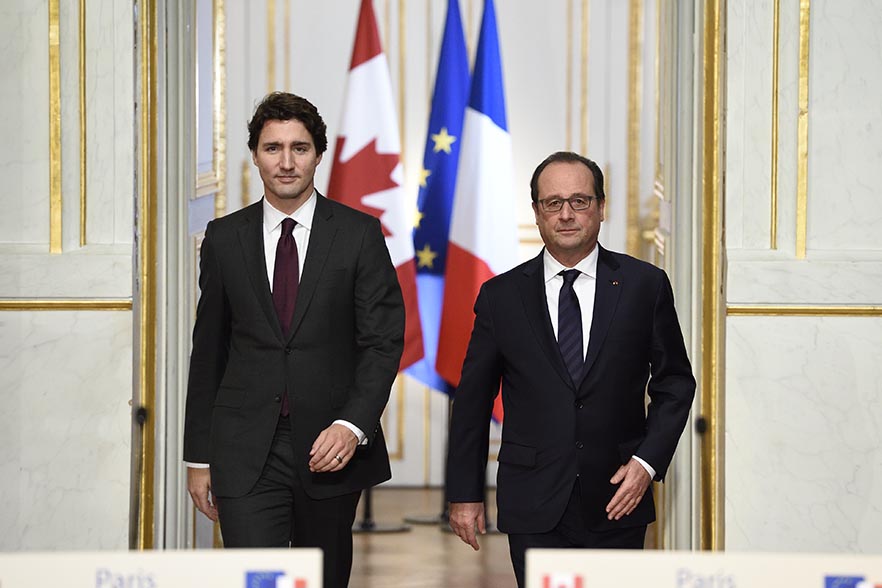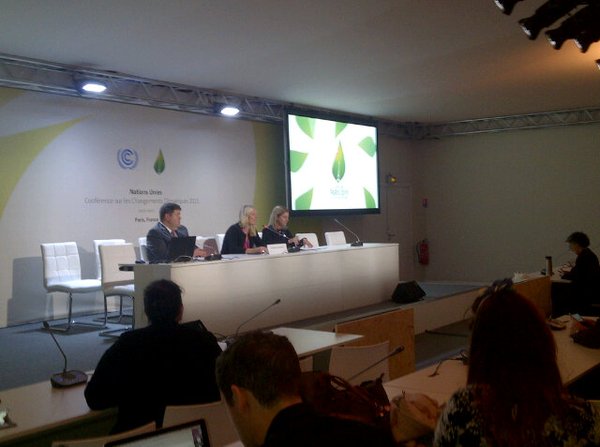Behind the scenes with Canada’s lead climate conference negotiator
The Liberals want an ambitious agreement at the Paris climate talks. Meet the woman who’s trying to get us there.
Share

Louise Métivier is caffeine-deprived. The lines for coffee at the Paris climate conference are long and slow-moving, and this morning security stopped her from bringing in liquids from outside the COP21 site. Métivier is in serious need of a shot of espresso: as Canada’s chief negotiator for climate change, she’s spending long hours locked in meeting rooms deciding what steps the world will take to limit global warming.
“I love coffee!” she laughed. “And it helps, if you can get your hands on one.”
 Métivier is surprisingly chipper given the hours she’s been keeping as the top Canadian at the climate talks. But then the two weeks of negotiations in Paris, which started Nov. 30 and will end Dec. 11, are like the Olympics for climate policy geeks and environmentalists. Métivier and negotiators from every other country sit on white leather chairs around an enormous table and work their way, phrase by phrase and sometimes word by word, through a 54-page document that will form the basis for an agreement to lower greenhouse gas emissions from 2020 to 2030. The job is surprisingly physical, according to people who have worked on negotiating teams at previous international environmental talks.
Métivier is surprisingly chipper given the hours she’s been keeping as the top Canadian at the climate talks. But then the two weeks of negotiations in Paris, which started Nov. 30 and will end Dec. 11, are like the Olympics for climate policy geeks and environmentalists. Métivier and negotiators from every other country sit on white leather chairs around an enormous table and work their way, phrase by phrase and sometimes word by word, through a 54-page document that will form the basis for an agreement to lower greenhouse gas emissions from 2020 to 2030. The job is surprisingly physical, according to people who have worked on negotiating teams at previous international environmental talks.
“[It’s] long, long days,” Métivier told Maclean’s in an interview in Paris. That means not enough food or sleep: she’s up at 6 a.m. to make sure she gets at least one solid meal, but rarely finds time to eat during the day unless someone puts a sandwich in her hand. The negotiators keep snacks in their bags, she said, and nibble on those. And when the talks adjourn for the night, there’s more work to be done, including briefing the people back in Ottawa. In this case, they’re six hours behind Paris, so the briefings have to be at the end of the day. “It evolves fast so you still have to do a lot of work when you get back to your hotel just to make sure everybody is well ready for the next day,” Métivier said. This kind of negotiation also takes an exhausting amount of focus. “Every word is important. Every issue that’s raised by somebody else, you have to be really listening because things evolve by the hour and you need to make sure you’re concentrating all the time,” she added.
Related: The rhetoric around climate change leadership has to change
But, like an Olympian, you could say Métivier’s spent her career training for this. Raised in Granby, Que., she earned her degree in economics at the University of Sherbrooke before moving to Ottawa to work for the federal government. She spent 16 years working on energy efficiency programs at Natural Resources Canada and landed at Environment Canada in 2005. Her career has revolved around energy policy and climate change, as well as stakeholder and provincial relations. That included four years where she led the federal effort to develop a national air quality management system, which all of Canada’s environment ministers endorsed.
The process to set up that system was so successful that Métivier’s former boss, Paul Boothe, uses it as a case study in his new role running the Lawrence National Centre for policy and management at Western’s Ivey Business School (Boothe is also a contributor to Macleans.ca).
Métivier’s work on air quality is great preparation for her new job representing Canada at the climate talks, said Boothe, the former deputy minister of Environment Canada. “She’s very determined to get where she needs to go, but over the years has learned to be patient,” he said. “She knows you don’t give up—if it’s not today, maybe it’s tomorrow.”
Related: Expectations build for Canada at Paris’s now-or-never climate summit

Patience will serve her well in Paris, as the UN talks are consensus-based, and progress in the main plenary room has been so slow this week they were at one point going backwards. But the side conversations are going better, according to observers at the conference. The “spinoffs,” as they’re known, allow smaller groups of countries to hold more narrowly focused discussions before returning to the main talks and hopefully moving things along.
Keeping in touch with the people in the spinoffs, tête-a-têtes with the co-chairs of the plenary session and major players like the EU, and briefings for the rest of the Canadian delegation pile on yet more meetings for our chief negotiator. At this point, however, she knows all the players well: they’ve all spent nearly a year in preparatory meetings and unofficial negotiations. took on the job last January, and can’t count how much time she’s spent on international flights since then. A pace that had already cost her every long weekend in 2015 ramped up further with a new government elected six weeks before the talks started.
Still, Métivier exudes energy, and says the Canadian team is really engaged in the talks. “I’m extremely excited about this job. That keeps you going.”